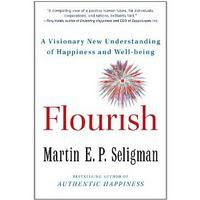 Two recommendations today:
Two recommendations today:1) Flourish, a new book by Martin Seligman.
Ever since the Framers of the Constitution claimed that the pursuit of happiness is an inalienable right, Americans have been obsessed with the idea. At some universities, the study of happiness has even become an academic discipline. Seligman, the father of positive psychology, was at the helm of this movement.
Now he's done an about-face. He argues that to flourish, we shouldn't obsess about happiness but should focus instead on five separate elements of well-being, each pursued for its own sake: positive emotion, engagement (the feeling of being lost in a task), relationships, meaning and accomplishment.
Want to learn more? Click here to read a recent NYT article that describes each element in greater depth.
2) Brene Brown's TED Talk (below). In this riveting video, a professor of social work at the University of Houston speaks about the importance of vulnerability in increasing our connectedness to others. She says that the more vulnerable and less perfect we allow ourselves to be, the better our relationships and sense of well-being.

